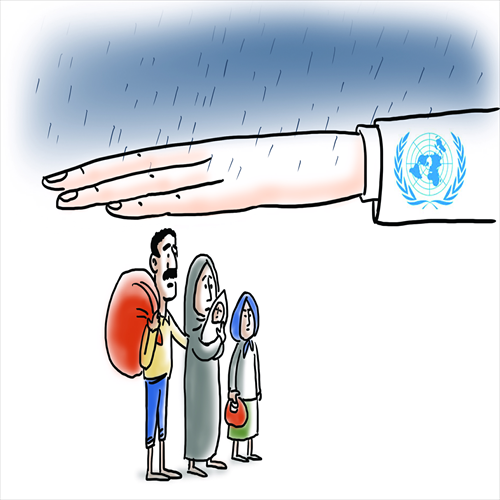HOME >> OP-ED
UN expects to halve internally displaced refugees by 2030, says relief chief
By Global Times Source:Xinhua Published: 2016-5-24 1:03:02

Illustration: Liu Rui/GT
The UN would like to see world leaders commit to halving the number of internally displaced people by 2030, UN relief chief Stephen O'Brien said on Sunday ahead of a key summit.
The UN is expecting leaders gathering in Turkey for the first-ever World Humanitarian Summit to commit to cutting the number of internally displaced people from 40 million in 2016 to 20 million by 2030, O'Brien, who is currently in the Turkish city of Istanbul, told Xinhua in a written interview.
There were 40.8 million people internally displaced worldwide as a result of conflict and violence by the end of 2015, according to a report published recently by the Internal Displacement Monitoring Center, an international body monitoring conflict-induced internal displacement.
The report noted that there were 8.6 million conflict-related new displacements in 28 countries in 2015; Yemen, Syria and Iraq accounted for over half of the global total.
"We are today facing a global humanitarian crisis of enormous proportions," said O'Brien, the UN under-secretary-general for humanitarian affairs, noting that there are more than 130 million people in need of assistance and protection.
And over 60 million people are forcibly displaced from their homes, many of them as refugees; half of these displaced are children, he added.
"It is first and foremost the affected people and communities themselves, and their national governments, who respond to the humanitarian needs," O'Brien pointed out, saying the international aid agencies, like UN agencies, NGOs and the Red Cross family are there to support the cause.
However, "we are stretched to the limit by the scale of need and the difficulties we are confronted with when trying to help, especially in conflicts where some 80 percent of our resources currently are spent," he said.
According to O'Brien, the financial resources required to address the needs have increased six-fold since 2003 to nearly $21 billion today, and typically, just around 60 to 65 percent of these requirements are met.
The World Humanitarian Summit, scheduled to be held on Monday and Tuesday in Istanbul, Turkey, is aimed to propose solutions to the worldwide humanitarian challenge.
Some 5,200 participants, including 65 heads of state and government, 177 UN member states, crises-affected communities, NGOs, the private sector and UN agencies will attend the Summit.
"At the Summit, we expect to see commitments to increase and diversify global funding for humanitarian emergencies," said O'Brien.
He illustrated that the funding may include financial contribution to UN's Central Emergency Response Fund and humanitarian programs, as well as new partnerships with the private sector.
O'Brien said the UN will also promote a "Grand Bargain" between donors and aid organizations to get more means into the hands of people in need by redirecting a billion dollars in efficiency savings to the front-line of humanitarian action over the next five years.
Reiterating UN's call for prevention of conflict, O'Brien stressed that "humanitarian aid can never be a substitute for a political settlement of the conflict."
"Humanitarian aid can keep civilians alive and alleviate their suffering, but it is not a solution," he said.
"We must support people by ending their needs in the first place instead of only delivering aid when the crisis in there; and we must invest in humanity," he said.
The article is a commentary from the Xinhua News Agency. opinion@globaltimes.com.cn
Posted in: Voices